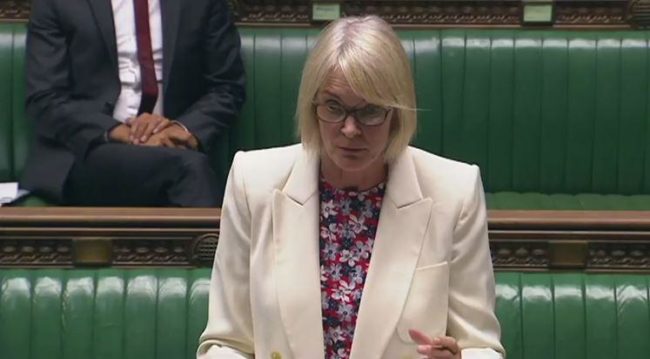Government urged to change law that ‘outs’ transgender business people

(Photo by Sean Gallup/Getty Images)
Former equalities minister Nicky Morgan has urged the government to change business law to prevent the former names of transgender people being published online.
The UK’s business directorship regulations require details about people who hold executive roles in limited companies to be published publicly via Companies House.
The details include a person’s entire history of appointments – while they are also obliged to list all of their former names.
There is no exemption for transgender people – meaning that trans people who own their own business face having their birth name published on the internet, where it is easily searchable.
Nicky Morgan, the former Secretary of State for Education and Minister for Women and Equalities, called for the rules to be reformed in Parliament last night to protect trans people’s privacy.
Speaking in the Commons, she read letters from several transgender people who had gotten in touch after being outed by their Companies House listing online.

Conservative backbench MP Nicky Morgan (Photo by DANIEL LEAL-OLIVAS/AFP/Getty Images)
One trans person, Alex, wrote: “I am the sole director of a company I set up some years back to manage a small property portfolio. When I changed my name and title the process to inform Companies House was actually very easy and my name was updated quickly.
“‘I noticed afterwards however, that this change of name and title was recorded in the company filings that are freely available for public inspection on the Companies House website. The document in question is a Change of Particulars for Director form and clearly states my original name and title and subsequently my new name and title. This very obviously discloses my change of gender to anyone who happens to look at the filing history of my company, publicly outing me without my consent.”
Another trans person wrote: “I changed my name and title by deed poll in 2012 and also need to change my details at Companies House as a director of my company.
“I’ve now had gender reassignment surgery and will be applying for my gender recognition certificate as soon as I receive the necessary report from the Gender Identity Clinic.
“Whilst this will give me a lot of protection in law it will still be possible for people to find out my dead name by interrogating the records of my company at Companies House which could possibly put me at risk if someone found out those details for malicious purposes.”
Another added: “My current position is that I am unable to start my business without running the very real risk of outing myself as a transgender woman.
“I want to start a business to provide technology and web development services. However, as I cannot yet transition, I am in the unfortunate position where if I started a business now and then transitioned this information would be publicly available.”
Speaking in the Commons, Mrs Morgan, who currently Chairs the Treasury Select Committee, said: “The case for this small legislative change is compelling, as such a disclosure can have a profound effect on transgender people, particularly as transition and history are very personal and should be something that a person chooses to share, rather than being forced to do so by someone else.
“The legal mechanism for people to change their gender is also not a decision that anyone enters into lightly, and nor does it happen quickly.
“In my experience, once that decision is made, transgender people want to be able to move on with their lives, to be treated with respect, and to live without the fear of being inadvertently outed or subject to violence.”
She added: “[This] would be a simple change to make, yet it would mean a great deal to the many transgender people who suffer this problem in silence. The Government have an opportunity to close this inadvertent loophole and to show that they are committed to protecting the transgender community and to allowing transgender people to choose what, if any, information about their transition is publically available and in what way such information is disclosed.
“I hope that, given the Government’s commitment to transgender equality, the Minister will consider this issue and the views of those who have contacted me as part of the upcoming review of the Gender Recognition Act. I look forward to hearing her response.”
Labour MP Stephen Doughty added: “I commend the right hon. lady on securing this Adjournment debate.
“I met one of my local trans support groups in Cardiff and they shared with me many of their concerns. Steps such as the one we are discussing can go a long way in reducing stigma.”
Responding to Mrs Morgan’s calls, business minister Margot James vowed to look at the issue.

Margot James
She said: “I have considerable sympathy with the personal accounts that she has shared in her speech this evening, and I can only conclude that the examples that she gives are backed up by many other people who have not come forward.
This debate highlights a difficult tension between two important principles: the right of an individual to have their private details remain private and not to be exposed against the also important need for transparency of the public register of companies.
“These rights are not easy to reconcile, but I very much agree with my right hon. Friend that we should make every effort to improve the situation that she described in her speech.”
However, she added: “There are some very important reasons why the records of companies must be transparent and available for anyone to inspect. Incorporating a company and getting it registered at Companies House brings with it the benefit of limited liability to the owners and directors charged with running the company.
“In return for that significant benefit, directors of companies must provide details relating to their identity, residential address information and annual accounts of the company. That process gives anyone the ability to check business records and the trading history of people and businesses that they are dealing with or proposing to enter into business with.
“It is only right that anyone should be able to check a director’s previous trading history or directorships, or any past disqualifications and bankruptcies. People might also want to know of their involvement in previous failed or successful businesses as important facts to consider when entering into business agreements.
“In many ways, the register of companies is not just a list of companies with directors’ names. Its real purpose is to support the functioning of limited liability and to enable business trading across the economy through the information that it provides. It is that transparency that underpins its value and contribution.
“The register of companies is one of the most searched and interrogated databases worldwide. There were more than 2 billion searches on the website in 2016.
“It is also widely used by professional organisations—for example, credit reference agencies in determining whether to loan to prospective businesses, or professional researchers such as those engaged in transparency initiatives.”
She added: “I do recognise that the register of companies should look to strike the right balance between the need for transparency and the protection of individuals and their private information.
“The current legal provisions already allow for certain information to be withheld from public inspection—for example, a director’s private residential addresses, where it is demonstrated that there is a risk of violence or intimidation arising from the activities of the company.
“Since the register of companies became freely available online in 2015, however, a number of hon. Members have written to me raising their concerns about the range of private information that is now publicly available and easily accessible.
“As a result, my Department is considering a number of potential measures related to the integrity of the register of companies and the personal information that is available on it. I will most certainly ensure that the issue raised by my right hon. Friend is considered within that work.
“Although I can commit to consider the issue further, I would stress that the position of company director carries with it statutory duties and accountabilities. We need to guard against the creation of loopholes that would allow people to evade their responsibilities or to conceal their previous trading history by changing their name on the register.”

